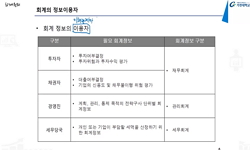This paper investigates the relation between financial reporting quality and corporate cash holdings on a sample of 6,832 firm-year observations between 1980 and 2008. Financial reporting quality has been posited to reduce asymmetric information, agen...
http://chineseinput.net/에서 pinyin(병음)방식으로 중국어를 변환할 수 있습니다.
변환된 중국어를 복사하여 사용하시면 됩니다.
- 中文 을 입력하시려면 zhongwen을 입력하시고 space를누르시면됩니다.
- 北京 을 입력하시려면 beijing을 입력하시고 space를 누르시면 됩니다.
https://www.riss.kr/link?id=A87029690
- 저자
- 발행기관
- 학술지명
- 권호사항
-
발행연도
2009
-
작성언어
-
- 주제어
-
KDC
300
-
자료형태
학술저널
-
수록면
1-28(28쪽)
- 제공처
-
0
상세조회 -
0
다운로드
부가정보
다국어 초록 (Multilingual Abstract)
This paper investigates the relation between financial reporting quality and corporate cash holdings on a sample of 6,832 firm-year observations between 1980 and 2008. Financial reporting quality has been posited to reduce asymmetric information, agency cost and capital cost and in turn improve investment efficiency. As a result, firm with higher accrual quality leads corporate manager to reduce corporate cash holdings. The evidences from this study are as follows: First, according to portfolio approach, small firm has higher accrual quality, implying poor accounting information quality, and also this evidence is consistent with what small firm has higher asymmetric information rather than large firm. Second, the accrual quality as proxy of financial accounting information quality affects significantly positive effect on cash holdings statistically, economically, and financially. Thus the Magnitude effect at a one standard change in the accrual quality increase leads to increase 0.26% or 0.27% on the level of cash holdings. Third, If firm increases the amount of short term borrowing from bank and is in presence of cash substitution, it tends to decrease the level of cash holdings. In contrast with this, firm with higher cash flow allow to keep high the level of cash holdings. Fourth, after classifying Before IMF and After IMF from full sample, the sensitivity of accrual quality on cash holdings is higher in sample of Before IMF. That is, one standard deviation increase in accrual quality leads to 0.32% or 0.55% increase in the level of cash holdings during the period of Before IMF, which comparing 0.23% or 0.41% increase during period of After IMF. To check the robustness of these results, alternative accrual qualities are used and after all, above all results are consistent and robust regardless of any alternative proxies and models. In conclusions, The evidences in this study suggest that financial reporting quality mitigates information asymmetries arising from adverse selection problems and agency conflicts. Finally, the positive relation between financial reporting quality and cash holdings is stronger for firms with low quality information environments. Overall, this paper has very important implications for all stakeholders who are related to firm`s financial decision strategy and the economic consequences of enhanced financial reporting.
동일학술지(권/호) 다른 논문
-
- 한국금융공학회
- 박종원
- 2009
-
The Effect of Seniority and Security Covenants on Bond Price Reactions to Credit News
- 한국금융공학회
- ( David D. Cho )
- 2009
-
- 한국금융공학회
- 김성신
- 2009
-
Political Economy of Privatized Economy
- 한국금융공학회
- ( Seung Doo Choi )
- 2009




 KISS
KISS


